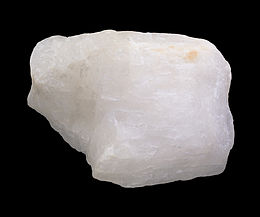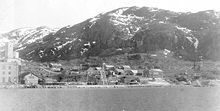Cryolite
| Cryolite | |
|---|---|
 Cryolite from Ivittuut, Greenland | |
| General | |
| Category | Halide mineral |
| Formula (repeating unit) | Na3AlF6 |
| IMA symbol | Crl[1] |
| Strunz classification | 3.CB.15 |
| Dana classification | 11.6.1.1 |
| Crystal system | Monoclinic |
| Crystal class | Prismatic (2/m) (sameH-M symbol) |
| Space group | P21/n |
| Unit cell | a = 7.7564(3) Å, b = 5.5959(2) Å, c = 5.4024(2) Å; β = 90.18°; Z = 2 |
| Identification | |
| Formula mass | 209.9 g mol−1 |
| Color | Colorless to white, also brownish, reddish and rarely black |
| Crystal habit | Usually massive, coarsely granular. The rare crystals are equant and pseudocubic |
| Twinning | Very common, often repeated or polysynthetic with simultaneous occurrence of several twin laws |
| Cleavage | None observed |
| Fracture | Uneven |
| Tenacity | Brittle |
| Mohs scalehardness | 2.5 to 3 |
| Luster | Vitreous to greasy, pearly on {001} |
| Streak | White |
| Diaphaneity | Transparent to translucent |
| Specific gravity | 2.95 to 3.0. |
| Optical properties | Biaxial (+) |
| Refractive index | nα= 1.3385–1.339, nβ= 1.3389–1.339, nγ= 1.3396–1.34 |
| Birefringence | δ = 0.001 |
| 2V angle | 43° |
| Dispersion | r < v |
| Melting point | 1012 °C |
| Solubility | Soluble in AlCl3solution, soluble in H2SO4with the evolution of HF, which is poisonous. Insoluble in water.[2] |
| Other characteristics | Weakly thermoluminescent. Small clear fragments become nearly invisible when placed in water, since its refractive index is close to that of water. May fluoresce intense yellow under SWUV, with yellow phosphorescence, and pale yellow phosphorescence under LWUV. Not radioactive. |
| References | [3][4][5][6][7] |
Cryolite(Na3AlF6,sodium hexafluoroaluminate) is an uncommonmineralidentified with the once-large deposit atIvittuuton the west coast ofGreenland,mined commercially until 1987.[8]
It is used in the reduction ( "smelting" ) of aluminium, in pest control, and as a dye.
History
[edit]Cryolite was first described in 1798 by Danish veterinarian and physician Peder Christian Abildgaard (1740–1801);[9][10]it was obtained from a deposit of it in Ivigtut (old spelling) and nearby Arsuk Fjord, Southwest Greenland.[11]The name is derived from theGreek languagewordsκρύος(cryos) = frost, andλίθος(lithos) = stone.[12]ThePennsylvania Salt Manufacturing Companyused large amounts of cryolite to makecaustic sodaandfluorinecompounds, includinghydrofluoric acidat itsNatrona, Pennsylvania,works, and at its integrated chemical plant inCornwells Heights, Pennsylvania,during the 19th and 20th centuries.[citation needed]
It was historically used as an ore of aluminium and later in the electrolytic processing of thealuminium-rich oxideorebauxite(itself a combination ofaluminium oxideminerals such asgibbsite,boehmiteanddiaspore). The difficulty of separating aluminium from oxygen in the oxide ores was overcome by the use of cryolite as afluxto dissolve the oxide mineral(s). Pure cryolite itself melts at 1012 °C (1285K), and it can dissolve the aluminium oxides sufficiently well to allow easy extraction of the aluminium byelectrolysis.Substantial energy is still needed for both heating the materials and the electrolysis, but it is much more energy-efficient than melting the oxides themselves. As natural cryolite is now too rare to be used for this purpose, synthetic sodium aluminium fluoride is produced from the common mineralfluorite.[citation needed]
In 1940 before entering World War II, the United States became involved with protecting the world's largest cryolite mine in Ivittuut, Greenland from falling into Nazi Germany's control.[13]
Source locations
[edit]
BesidesIvittuut,on the west coast ofGreenlandwhere cryolite was once found in commercial quantities, small deposits of cryolite have also been reported in some areas ofSpain,at the foot ofPikes PeakinColorado,Francon Quarry nearMontrealinQuebec,Canadaand also in Miask,Russia.[14][15]
Uses
[edit]Molten cryolite is used as a solvent foraluminium oxide(Al2O3) in theHall–Héroult process,used in the refining ofaluminium.It decreases the melting point of aluminium oxide from 2000–2500 °C to 900–1000 °C, and increases its conductivity[16]thus making the extraction of aluminium more economical.[17]
Cryolite is used as aninsecticideand apesticide.[18]It is also used to givefireworksa yellow color.[19]
Physical properties
[edit]
Cryolite occurs as glassy, colorless, white-reddish to gray-black prismaticmonocliniccrystals. It has aMohs hardnessof 2.5 to 3 and aspecific gravityof about 2.95 to 3.0. It is translucent to transparent with a very lowrefractive indexof about 1.34, which is very close to that ofwater;thus if immersed in water, cryolite becomes essentially invisible.[7]
References
[edit]- ^Warr, L.N. (2021)."IMA–CNMNC approved mineral symbols".Mineralogical Magazine.85(3): 291–320.Bibcode:2021MinM...85..291W.doi:10.1180/mgm.2021.43.S2CID235729616.
- ^CRC Handbook of Chemistry and Physics,83rd Ed., p. 4–84.
- ^Gaines, Richard V.; Skinner, H. Catherine W.; Foord, Eugene E.; Mason, Brian; Rosensweig, Abraham (1997).Dana's new mineralogy: the system of mineralogy of James Dwight Dana and Edward Salisbury Dana(8th, entirely rewritten and greatly enl. ed.). New York: Wiley.ISBN978-0-471-19310-4.
- ^"Cryolite: Cryolite mineral information and data".Mindat.org.3 October 2010.Retrieved25 October2020.
- ^"Cryolite Mineral Data".Webmineral.Retrieved25 October2010.
- ^"Cryolite"(PDF).Handbook of Mineralogy.Retrieved25 October2010.
- ^abKlein, Cornelis; Hurlbut, Cornelius S. (1985).Manual of mineralogy: (after James D. Dana)(20th ed.). New York: Wiley.ISBN0-471-80580-7.
- ^"Eclipse Metals buys unique historical cryolite mine in Greenland".im-mining.15 January 2021.Retrieved11 July2022.
- ^Abildgaard (1799)."Norwegische Titanerze und andre neue Fossilien"[Norwegian titanium ores and other new fossils [i.e., anything dug out of the earth])].Allgemeines Journal der Chemie(in German).2:502.
In der ordentlichen Versammlung der königl. Gesellschaft der Wissenschaften am 1. Februar dieses Jahres stattete Hr. Prof. Abildgaard einen Bericht über die Norwegischen Titanerze und über die von ihm mit denselben angestellten Analysen ab. Zugleich theilte er auch eine Nachricht von einer vor wenigen Jahren aus Grönland nach Dänemark gebrachten besonders weißen spathartigen Miner mit. Einer damit angestellten Untersuchung zu folge bestand sie aus Thonerde und Flußspathsäure. Eine Verbindung, von welcher noch kein ähnliches Beyspiel im Mineralreich vorgekommen ist. Sie hat den Namen Chryolit erhalten, weil sie vor dem Löthrohre wie gefrorne Salzlauge schmilzt.
(At the ordinary session of the [Danish] Royal Society of Science on February 1st of this year, Prof. Abildgaard presented a report about Norwegian titanium ores and about the analysis of them undertaken by him. He also communicated a notice of an especially white, spar-like mineral that was brought several years ago from Greenland to Denmark. According to an investigation performed on it, it consists of alumina and hydrofluoric acid. A compound of which no similar example in the mineral realm has yet been found. It received the name "cryolite" because under a blowpipe, it melts like frozen brine.) - ^Abildgaard, P. C. (1800)."Om Norske Titanertser og om en nye Steenart fra Grönland, som bestaaer af Flusspatsyre og Alunjord"[On Norwegian titanium ores and on a new mineral from Greenland, which consists of hydrofluoric acid and alumina].Det Kongelige Danske Videnskabers-Selskabs (The Royal Danish Scientific Society).3rd series (in Danish).1:305–316.
[From p. 312] Han har kaldt denne grönlandske SteenKryolithellerIissteenformedelst dens Udseende, og fordi den smelter saa meget let for Blæsröret.
(He has named this Greenlandic stonecryoliteorice stoneon account of its appearance, and because it melts so easily under a blowpipe.) - ^The Brazilian statesman and scientistJosé Bonifácio de Andrada e Silvaalso analyzed cryolite:
- d'Andrada (1800)."Kurze Angabe der Eigenschaften und Kennzeichen einiger neuen Fossilien aus Schweden und Norwegen, nebst einigen chemischen Bemerkungen über dieselben"[Brief statement of the properties and characteristics of some new minerals from Sweden and Norway, together with some chemical observations about the same].Allgemeine Journal der Chemie(in German).4:28–39.Cryolite (Chryolit) is discussed on pp. 37–38. From p. 38:"Dieses sonderbare Fossil besteht aus Thonerde, Fluẞspathsäure und ein klein wenig Kali. Er kommt vor in Grönland,…"(This strange mineral consists of alumina, hydrofluoric acid and a very little potassium carbonate. It occurs in Greenland,… )
- Reprinted in French:d'Andrada (1800)."Des caractères et des propriétés de plusieurs nouveaux minéraux de Suède et de Norwège, avec quelques observations chimiques faites sur ces substances"[The characters and properties of several new minerals from Sweden and Norway, with some chemical observations on these substances].Journal de Physique, de Chimie, et d'Histoire Naturelle et des Arts(in French).51:239–246.
- Reprinted in English:d'Andrada (1802)."Short notice concerning the properties and external characters of some fossils from Sweden and Norway; together with some chemical remarks upon the same".Journal of Natural Philosophy, Chemistry and the Arts.5:193–196, 211–213.See "Chryolite" on pp. 212–213.
- ^Albert Huntington Chester,A Dictionary of the Names of Minerals Including Their History and Etymology(New York, New York: John Wiley & Sons, 1896),p. 68.
- ^Magazine, Smithsonian."How This Abandoned Mining Town in Greenland Helped Win World War II".Smithsonian Magazine.Retrieved2023-03-26.
- ^"CRYOLITE (Sodium Aluminum Fluoride)".galleries.Retrieved2020-10-07.
- ^"Cryolite | mineral".Encyclopedia Britannica.Retrieved2020-10-07.
- ^Cassayre, Laurent; Palau, Patrice; Chamelot, Pierre; Massot, Laurent (11 November 2010)."Properties of Low-Temperature Melting Electrolytes for the Aluminum Electrolysis Process: A Review"(PDF).Journal of Chemical & Engineering Data.55(11): 4549–4560.doi:10.1021/je100214x.
- ^Totten, George E.; MacKenzie, D. Scott (2003).Handbook of Aluminum: Volume 2: Alloy production and materials manufacturing. vol. 2.New York, NY: Marcel Dekker, Inc.ISBN0-8247-0896-2.
- ^Rao, J.R.; Krishnayya, P.V.; Rao, P.A. (2000)."Efficacy of cryolite against major lepidopteran pests of cauliflower".Plant Protection Bulletin.52(3/4): 16–18.ISSN0378-0449.Retrieved17 June2021.
- ^Helmenstine, Anne Marie."How Firework Colors Work and the Chemicals That Make Vivid Colors".ThoughtCo.Retrieved2019-09-01.
